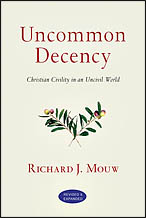
Last week, I asked how you handle anti-Christian rhetoric. This week, let me share my three concerns about verbal attacks on Christianity —specifically, those that come from academic scientists like Richard Dawkins and PZ Myers.
Spiritual/Theological: I’m currently reading Richard Mouw’s Uncommon Decency: Christian Civility in an Uncivil World (InterVarsity Press, Revised and Expanded, 2010), in which Mouw calls for Christians to exhibit a “convicted civility” that honors justice, truth, and the divine image in other human beings. He describes a moment at the United Nations when Palestinians and Israelis traded accusations of genocide:
In the Israeli-PLO debates, both sides raise significant issues, ones that are not easily resolved —questions about ethnicity and nationhood, religious pluralism, national borders and so on. But they set up the conversation in such a way that these important matters were extremely difficult to discuss. (49)
There are significant issues to discuss in the relationship between science and religion. In the case of the AAAS panel I mentioned last week, which dealt specifically with climate change, there’s good reason to believe that the issue at hand can be addressed only if secular scientists and evangelical Christians find common ground. Evangelicals make up over 30% of the US population, and it’s difficult to imagine that any significant climate change legislation could ever be passed without evangelical support. Unfortunately, some scientists thought that it was more important to focus on name-calling.
I know why Myers, Dawkins, et al. use such strong rhetoric —they want to win. Some Christians use the same tactics. Because of my convictions about God and eternity, I worry about the ultimate fate of Dawkins and Myers. Even on this side of death, however, what kind of “victory” is it that results from badgering, mocking, and belittling your opponents? Sure, you might find yourself with the power and authority that you wanted, but what kind of person will you be?
Societal/educational: Second, I’m concerned about the effects of this rhetoric on science education and American society. It’s regularly noted that the US has a strong anti-intellectual streak, and that the scientific literacy of Americans is pretty dismal. One reason I’m involved with ESN is to help Christians better appreciate the importance of higher education and the life of the mind. None of these situations will be improved if Americans imagine scientists to be anti-religious bullies.
Academic/Scholarly: Finally, I’m concerned that this anti-Christian rhetoric undermines the very foundations of the academic enterprise. I love the university, and I especially love the ideals of academic scholarship: carefully crafted arguments, reasoning based on deep reflection, research topics held at arm’s-length so they can be better understood. Academia doesn’t always do this well, and sometimes it can’t let go of these principles at the appropriate time —for example, Wendell Berry has noted that we should learn from great writers, not about them.
Anti-Christian rhetoric like that I’ve cited above, however, doesn’t observe any of these ideals. The complex history of religion is collapsed into gross generalizations —which then become anti-historical myths, like the many falsehoods repeated endlessly about Galileo. Instead of seeking to understand theological and philosophical arguments, these attackers simply mock them out of their own ignorance. Dawkins has often commented that he doesn’t bother reading the arguments of theists, because he knows that they can’t have any value. The questions raised about Martin Gaskell were based on a second-hand rumor about his religious beliefs. This isn’t reason —it’s tribalism.
I don’t mind controversial discussions —inside or outside of academia. Within academia, however, shouldn’t controversies be based on, well, academic positions?
Next week, I’ll cover the other side of the coin: anti-academic rhetoric from Christians. Meanwhile:
What are your concerns about science-religion debates? Do you share mine, or do you approach from another angle?
The former Associate Director for the Emerging Scholars Network, Micheal lives in Cincinnati with his wife and three children and works as a web manager for a national storage and organization company. He writes about work, vocation, and finding meaning in what you do at No Small Actors.

Leave a Reply